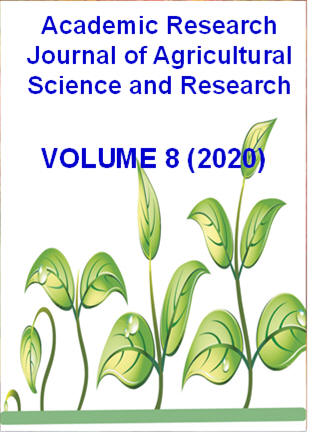|
ISSN: 2360-7874 |
Academic Research Journal of
Agricultural Science and Research |
|||||||||||||||||||
|
Vol. 8(3), pp. 156-163, April 2020 Research Prospects of host resistance and biocontrol agent for the management of hot pepper Fusarium wilt (Fusarium oxysporum f.sp. capsici) in the Central Rift valley of Ethiopia
Endriyas Gabrekiristos1, Daniel Teshome2 and Getachew Ayana1
1Ethiopian Institute of Agricultural Research, Melkassa Agricultural Research Center P.O. BOX 436, Adama, Ethiopia; 2Jimma University College of Agriculture and Veterinary Medicine, P.O. BOX 307, Jimma, Ethiopia; Corresponding author: endriasgabre@gmail.com
Accepted 30 April 2020
Hot pepper (Capsicum annum L.) is one of the important cash crops to Ethiopian smallholder farmers and an important agricultural commodity which contribute to export earnings. Fusarium wilt caused by Fusarium oxysporum f.sp. capsici(FOC) is one of the major pathogen that constrained production and productivity of hot pepper in Ethiopia. The present study was conducted to evaluate the potentials of host resistance and biological control for the management of this disease in one of the major hot pepper production regions in Ethiopia, the Central Rift Valley. Isolate 4DGK was used as the most virulent isolate with 100% wilt incidence to Mareko fana variety. As a result, it was used to evaluate the level of disease resistance in 21 varieties/accessions. Results obtained from wilt incidence and vascular disease index data analysis revealed significant differences in disease resistance. Nevertheless, Oda Haro and ACC80061 were the only promising materials that showed moderately resistant reaction with wilt magnitude of 33.3 and 25% respectively. Regarding the efficacy of the biocontrol agents, in vitro growth of FOC, significant variation has been observed and from the tested six bioagents, the highest mycelial growth inhibition (85.2%) was obtained from FOC treated by Trichoderma asperellum. In general, Fusarium wilt of hot pepper can be managed by using host resistance and biological control. Nevertheless, the efficacy and economic validity of these methods should be verified under multi-location field studies.
Key Words: Hot pepper, Fusarium wilt, Resistant evaluation, Bioagent
How to cite this article (APA Style): Endriyas G., Daniel T., Getachew A(2020). Prospects of host resistance and biocontrol agent for the management of hot pepper Fusarium wilt(Fusarium oxysporum f.sp. capsici) in the Central Rift valley of Ethiopia. Acad. Res. J. Agri. Sci. Res. 8(3): 156-163
|
|||||||||||||||||||
